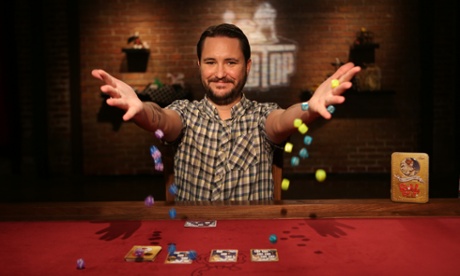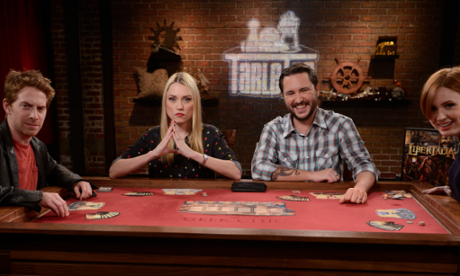
Like any fourteen-year-old Star Trek fan, Wil Wheaton dreamed of boldly going where no one had gone before. But unlike others Wheaton got the chance to live out his fantasy when he was cast as Wesley Crusher, the precocious son of the chief medical officer on the starship Enterprise.
“It was a profound experience for me”, Wheaton said. “When I first got to look at the bridge and the engine room and the transporters I wasn’t looking at a set, I was looking at the spaceship I had imagined since I was a child.”
Bookish and socially awkward, the young Wheaton ticked many of the boxes commonly associated with the Trekkie stereotype.
“When I was growing up the thing that determined your worth in the schoolyard or the playground was your physical prowess”, he said.
“If you were uncoordinated or not particularly strong then you gravitated towards books and things that required mental strength rather than physical strength. But to a lot of the kids who were cool or popular, we just seemed weird and difficult to understand.”
Wheaton’s Star Trek: The Next Generation character, though, was quite different. Intelligent, capable and confident, Wesley Crusher held his own in conflicts with older, more experienced officers, seeing off dangers and finding solutions to problems that eluded his crewmates.
To some viewers, the idea of a teenager repeatedly saving the day was irksome. Some took to online discussions to vent their disapproval – at times spilling over into vitriolic abuse of Wheaton himself.
“I can understand why some people were rubbed the wrong way,” Wheaton said. “But the people who were complaining were a very small but incredibly vocal minority who had access to Usenet at a time when nobody really knew what that was. These people were statistically over-represented back in the old days.”
Unstoppable trolls
The anonymity of online discussion, Wheaton says, makes abuse inevitable. Forum moderators can block offensive posts or ban the most disruptive trolls, but with a new identity only a few clicks away they invariably pop back up.
“Imagine you’re having a house party and 100 people show up. It’s really great and everyone’s having a lovely time, and then six guys show up who just want to start fights. Suddenly everyone who’s been having fun has to stop and deal with them.
“Now imagine that there’s no way to keep these guys out of your party. You can make them leave, but they’re just going to come in through the back door wearing a false moustache. The people who are genuinely enjoying themselves say: ‘To Hell with this, I’m going home’, and this tiny, tiny group have ruined a great thing for everyone else.”
It was dismay at such poisoning of online communities, particularly in gaming, that led Wheaton to address the Penny Arcade Expo (PAX) video games convention in 2007. There he set out a simple rule for online social interaction which has since become known as Wheaton’s Law: “Don’t Be A Dick.”
“I was having so much fun playing games with my friends, but when they weren’t available I would try to find strangers to play with and people were just shitty. They were nasty and awful and they made it not fun”, said Wheaton.
“And worse than that, it made the video game community unwelcoming and exclusionary. We want our communities to be growing, but when people are acting as gatekeepers and trying to kick people out then it limits our gene pool and we become kind of inbred and terrible.
“So ‘don’t be a dick’ makes sense. Everyone knows what that is. Everybody can generally agree on who’s being a dick in any given situation.”
But while Wheaton’s message was enthusiastically taken up by many gamers, trolling, bullying and threats remain an all-too-common part of the hobby – particularly for female players.
“What’s happening to women just now online is just an extension of what happens to women all the time out in the world”, Wheaton said. “Every woman I know has at one point been menaced or felt threatened by a man.
“But I think one of the hopeful things that we’ve seen has been a clear, unambiguous, massive majority of people saying that this is unacceptable and it has to stop.”
Responsibility for mistreatment of women in video gaming doesn’t end with gamers, he added. Game publishers also have a role to play in making their products welcoming for players.
“Ten years ago there was an idea that women didn’t play games. That’s clearly incorrect, but to some people there’s still an idea that if you make a game that isn’t exclusionary of women then you’re somehow threatening gaming – that’s super-childish.
“The industry needs to grow up and stop treating women as an anomaly.”
While gaming is close to Wheaton’s heart, he has also been a vocal campaigner on other tech issues.
Despite making a living from the creative industries – these days mixing live-action roles with voice acting in video games and animated series – he has lambasted industry groups for attempts to combat online piracy through legislation that impedes the free flow of information online.
“It’s been shown that what corporate lobby groups see as piracy isn’t wrecking or threatening the industry”, he said. “We’ve seen over and over again that people are driven to unauthorised downloads because their customer service needs aren’t being met. When we make it easy for people to be honest consumers, they do that. There will always be the 1% to 5% who just don’t want to pay for anything, but in the effort to stop them you’re hurting and alienating everyone else.
“A big part of the problem is that we have legislators who just do not understand computers. They rely on lobbyists to write legislation for them, and instead of trying to adapt to a changing media landscape they’re trying to cripple emerging technology and cling to a business model that was very profitable for a century, but is just no longer relevant.”
Wheaton releases much of his own material under a creative commons licence, a model that allows for copying, sharing and modifying content.
“I think the greatest threat to artists isn’t piracy, it’s obscurity”, he said.
“By licensing works to the creative commons we encourage people to make derivative works from the things we’ve created. We gain access to new artists and new creative work. We grow a vibrant arts community that prevents a small number of well-promoted, well-financed, corporate-backed artists from dominating the culture.”
Analogue games
New approaches to content distribution have led to a wave of creativity and innovation in online media. Wheaton’s most notable contribution has been his hit YouTube series TableTop, where bloggers, writers, actors and comedians play geek-friendly board and card games.
Now in its third series, paid for by a crowdfunding campaign that saw fans pledge more than $1.4m (£890,000), the show has attracted millions of viewers.

“The original idea was that I’d do a show reviewing board games, but I think the best way to show how great games are is to play them”, Wheaton said.
“I thought we could do a show like Celebrity Poker, but with board games. I said: ‘Let’s call it something like TableTop, but better.’”
The programme’s premise seems improbable to anyone who hasn’t seen it. With players sitting around a table rolling dice and pushing tokens, board gaming isn’t the most obvious spectator sport. But by focusing on games as a framework for social interaction, TableTop delivers humour, enthusiasm and unabashed nerdishness – an infectious combination that’s contributed to a recent surge in board game sales.
“It would never have been sold to broadcast or cable”, Wheaton said. “They would never have believed that we could make it interesting. They would demand that we manufacture drama. They would make it all about winning, which is the antithesis of what TableTop is about.
“I play tabletop games as a social activity. I do enjoy a strategic challenge or something that lets me have an imaginative storytelling experience, but when I get together with my friends or family it’s an excuse to be social, and the games can become almost secondary to that.”
Ultimately, Wheaton said, the appeal of analogue gaming is the friendships that can be formed across the table.
“Like everyone I played Monopoly and Sorry as a kid, but in the 1980s when I discovered [the fantasy adventure roleplaying game] Dungeons & Dragons it was something that really let me use my imagination and my creativity.
“When you’re having this shared experience with people, exploring fantastic worlds and having incredible adventures without ever leaving the table, that’s gaming at its absolute best, and it’s been the mortar and the cornerstone that holds together the longest-lasting and most meaningful relationships of my life.”
TableTop is available to view now on the Geek & Sundry YouTube channel.







